William Gibbs is best known for being one of two bakers in Selkirk during the late 1800s and early 1900s. The Gibbs name is remembered by the community for Gibbs’ Drug Store which William’s sons, Harry and Frederick started and continued in 1890.
William was born to the town baker in Taunton, England in 1845. He helped his father at his shop from an early age, learning the skills of the trade which he would bring with him to Selkirk a few decades later.
As a teenager, William was helping the delivery man unload a wagon full of flour. He had his back turned to the wagon in preparation for the delivery man to place a sack of flour on his back, but instead doing this, the delivery man tossed it at William. The bags of flour were over 200lbs, breaking Williams back, and resulting in permanently curved shoulders.
Passage to America
In 1868, he moved north to Bridgewater where he started a bakery of his own. He married Mary Jones Gabriel a year later and within the next few years their daughter Annie was born, and then Harry. Shortly after, hard times hit the country, and the bakery closed.
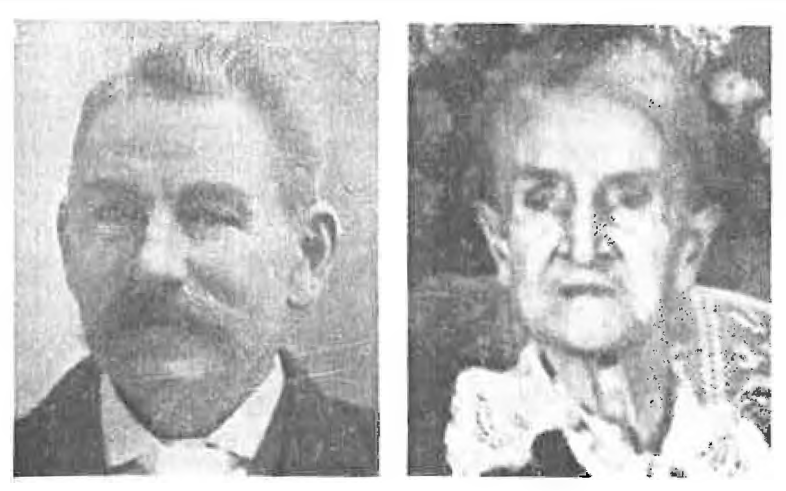
William left his family behind in 1874 to search for better work in the United States. There was word of a baker being needed in Auburn, Alabama. Mary, her sister Lizzie, and the two children boarded a ship soon after to come to America. The trip took 6 six weeks, and the boat was almost shipwrecked during the passage. The journey was harrowing, with Mary tying her children to her to prevent them from falling overboard and drowning. When they arrived safely, Mary and the children continued to Auburn where they reunited with William. Mary’s sister, Lizzie moved to Washington DC.
Off to Canada
A third child, Clifford, was born and the family of five migrated to Canada, having saved enough money for the move. They traveled by train, boat, and oxcart, experiencing the shrill squeal of unoiled oxcart wheels. William found work as a baker in Winnipeg and the family lived on a homestead in Woodlands for a season.
The winter was especially intense that year with reports of cattle being frozen right into snow drifts. One day William took Harry out on the oxcart to get a load of firewood. Harry fell off the cart and the ox, startled, trampled him. Thinking Harry had died, William brought him home to discover that his son had only suffered a head injury which left him deaf in one ear. Incidentally, homesteading wasn’t the right fit, and the family moved to Selkirk in 1876.
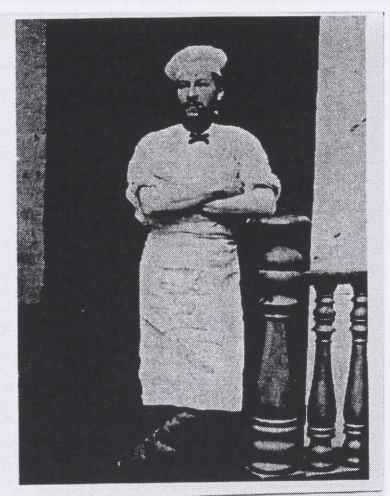
Once settled in Selkirk, the family found a log house near Morris Avenue and Eveline Street to live in for the first year, and William started up his own bakery. William and Mary’s fourth child, Herbert was born in the log house, and shortly afterward the family moved to a house on Clandeboye Avenue where George was born. Moving yet again, they built a larger home with three upstairs’ bedrooms, a small root cellar, and downstairs: a store in the front with an old-fashioned clay oven in the back. Lizzie was born, and the Gibb’s seventh child, Spencer, was born in 1882, however, he didn’t survive infancy. Mary fell sick with tuberculosis and died in 1883. William remarried to Mary Griffin in 1884 and they had their first child, Frank in 1885, completing a very busy four years.
Bread and Butter
Along with a growing family, William’s bakery business was also growing. He built a bakehouse nearby to expand into, and so that the old oven in his home could be torn out and the room converted to a bedroom. At first, he produced 20 loaves a day, which he, along with his sons, sold from a dogsled to settlers along the river and at Lower Fort Garry.
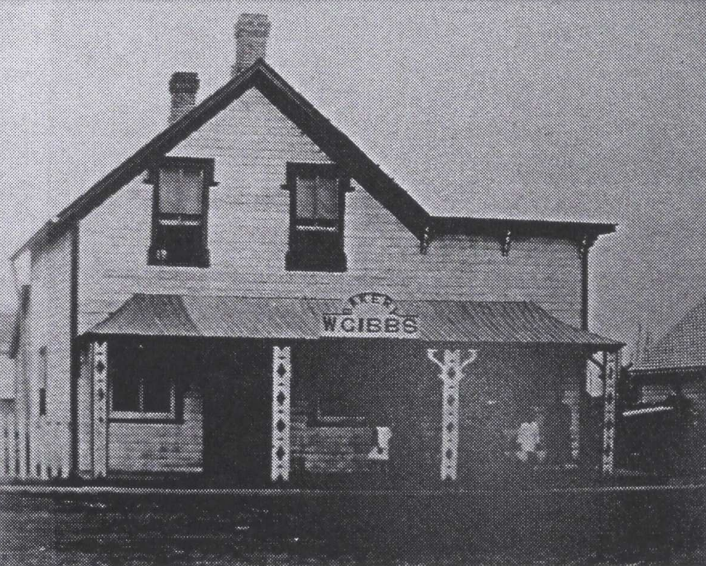
By 1895, William had opened a large store on Manitoba Avenue and was turning out 100 loaves a day. He had employees to distribute the bread throughout the town from a ‘neat delivery wagon.’ Along with L. Moncrieff, the other baker in town, he obtained the contract to supply bread to the Manitoba Asylum (now Selkirk Mental Health Centre).
Other Endeavors
William Gibbs, admired for his ‘sterling integrity’ by the community was elected as a trustee and treasurer of the local school board. He held this position for 16 years until his death. He also served several terms on town council.
However, his hand in politics didn’t stop at town council. As an executive member of the Manitoba Liberal Party, and along with fellow liberals, W.H. Eaton, F.W. Colcleugh, James F. Reid, and William Overton, he organized the Selkirk Electric Company in 1890. This brought modern convenience to the town.
Like some of the same men, he was a Mason, and one of the first members of Lisgar Lodge No. 2. His involvement in the fraternity awarded him a masonic funeral upon his death in 1903.
William Gibbs was on the Hospital Board, which was formed to organize the building of Selkirk General Hospital. He was also the president of the St. Andrews Agricultural Society which organized the Selkirk Fair and Rodeo since 1878.
William Gibbs was an elder and member of Knox Presbyterian Church, being the choir leader at the first congregational service. The stained-glass windows dedicated to the church in the early 1900s are in the memory of William Gibbs as well as Lawrence and Ann Moncrieff.
The Gibbs Boys
Walter Henry Gabriel Gibbs, known as Harry, was born in 1872. He trained to be a pharmacist and apprenticed under R. H. Gilhuly, who founded Selkirk’s first drug store. Harry built Gibbs Drug Store in 1897 and ran it for fourteen years. When Harry’s half-brother, Frederick completed his own pharmacy education, Harry left to pursue a medical degree at Hamline University in Minneapolis. Frederick continued to run Gibbs Drugs from 1911 until his retirement in 1952.
After completing his degree Harry joined the Royal Canadian Army Medical Corps and was stationed to one of the front-line medical stations in France during World War I. Following the war, he returned to Selkirk to become of the town’s two doctors. He had a long and distinguished 30-year career providing medical services to residents of Selkirk and the surrounding area, as well as in the north.

Harry became Mayor in 1922 and from 1926-27. His home would later be converted to the Army, Navy and Air Force clubrooms. He was the school Board chairman in the 1930s and was honorary co-chairman of the Selkirk and District War Memorial Fund. Harry retired in 1948 and died in 1952.
Gibbs Drugs is thought to have spent 93 years on Manitoba Avenue with a total of 100 years in business.
William Gibbs Collection

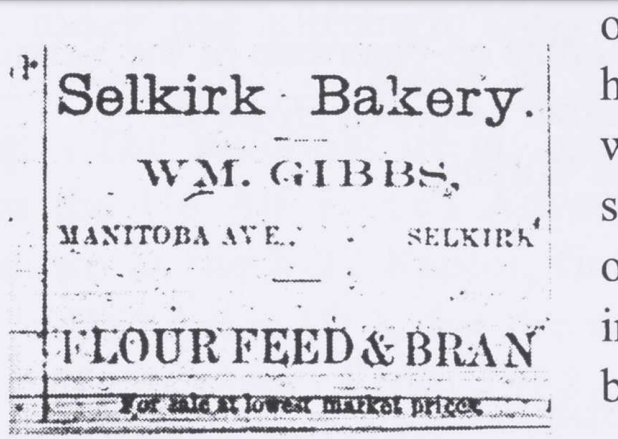

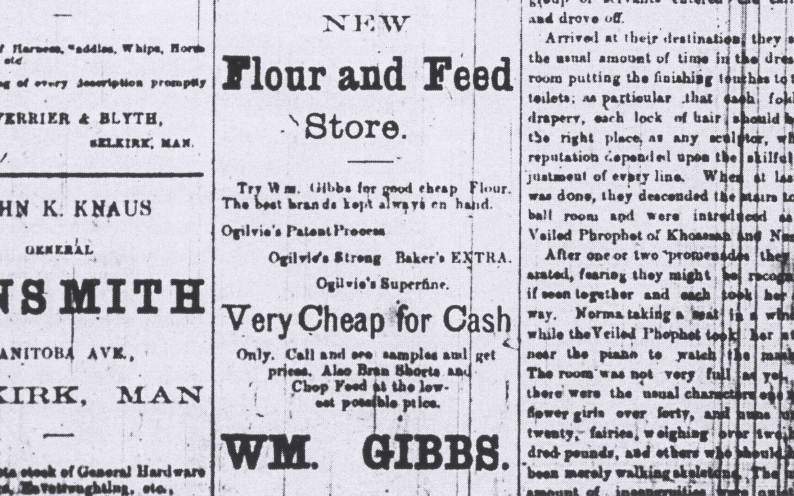


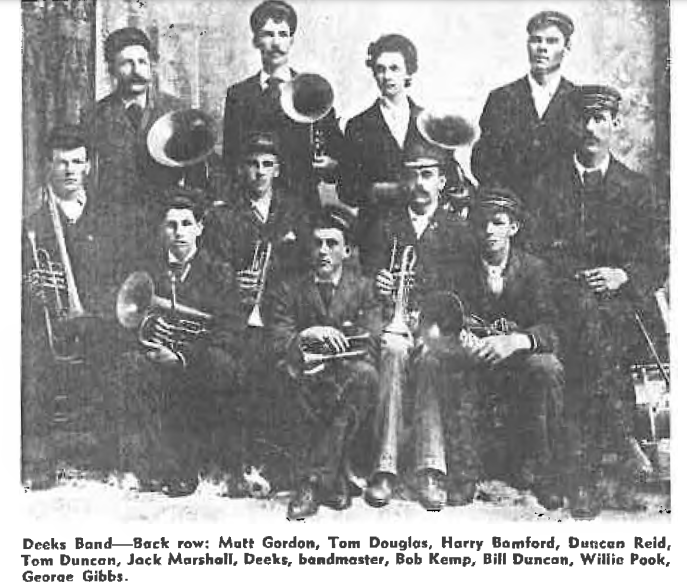
Sources
Selkirk the First Hundred Years, Barry Potyondi
Manitoba Historical Society – William Gibbs
Red River Ancestry – William Gibbs
Selkirk’s 75th Anniversary, Elsie MacKay ed.
Stories of Selkirk Pioneers and Their Heritage, Kenneth G. Howard

